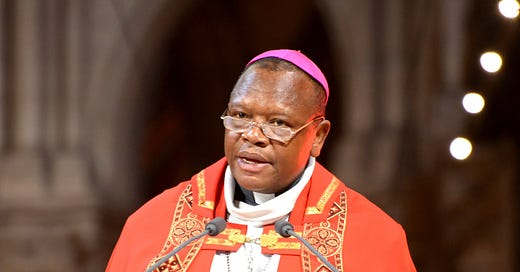Meet the conclave: Cardinal Fridolin Ambongo
The Congolese cardinal rides motorcycles and wants to go to the moon - if necessary
Fridolin Ambongo Besungu was born on Jan. 24, 1960, just months before the country then known as the Belgian Congo gained its independence after 75 harrowing years of colonial rule.
The following decades would be full of upheavals for the Democratic Republic of the Congo — and, at times, for Ambongo.

The future cardinal was born in Boto, in Sud-Ubangi, a province in the far northwest of the country that serves as a crossroads between the DRC, the Republic of Congo, and the Central African Republic. Ambongo’s father worked on a coffee plantation, providing a decent if frugal life for his family of 11 children.
“We weren’t destitute; we lived in a workers’ camp; there was enough to eat and water on our plot,” Ambongo recalled.
At school, he encountered a Belgian priest who struck him as “a refined human being who was everybody’s father.” Inspired by the missionary’s example, he entered the Capuchin order at the age of 20.
The country, then known as Zaire, was led by the despotic Mobutu Sese Seko, who came from the same Équateur region as Ambongo. When Ambongo went to cast his first ballot, he discovered that only green papers, indicating support for Mobutu, were available at the polling station. When his request for a red paper, a vote for the opposition, was refused, he left without casting a ballot — an early sign of his dogged commitment to justice.
Ambongo was ordained to the priesthood in 1988, and studied moral theology in Rome from 1991 to 1995. He was elected provincial superior of the Capuchins in the Congo in 1997, the year Mobutu was ousted by rebel forces led by Laurent-Désiré Kabila. To bring aid to his brothers and the wider population, Ambongo traveled through battle-shattered areas of the country, negotiating roadblocks manned by young, jittery soldiers.
In 2004, Ambongo was named Bishop of Bokungu-Ikela. The pope quickly added to his responsibilities, appointing him apostolic administrator of two neighboring dioceses. During this period, he was pictured visiting his flock on the back of a motorcycle, wearing his zucchetto and blue rubber boots.
In 2018, Ambongo was named archbishop of the Kinshasa archdiocese, which serves almost eight million Catholics, succeeding Cardinal Laurent Monsengwo Pasinya. He received the cardinal’s red hat a year later.
Pope Francis named Ambongo to his Council of Cardinal Advisers in 2020, giving the body’s sole African member up-close experience of the mechanisms of the Roman curia and struggles of the Universal Church.
A defining moment came for Ambongo in 2023, when the pope approved the publication of Fiducia supplicans, a Vatican declaration addressing same-sex blessings. As president of the Symposium of Episcopal Conferences of Africa and Madagascar, Ambongo spearheaded resistance to the document, heading to Rome to secure an opt-out for the continent, confirming his status as an ecclesiastical heavyweight.
In an address after returning from Rome, Ambongo offered a scorching critique of Western mores. The West, he argued, was destroying its foundations by rejecting the family, marriage, and children.
“Little by little, they will disappear. They will disappear. We wish them a good demise [Nous leur souhaitons bonne disparition],” the cardinal said, to laughter and applause.
In the same speech, Ambongo lamented that the West was seeking to impose its vision on the rest of the world, citing Russian President Vladimir Putin’s criticism of “the West’s decadent morals.”
Months later, Ambongo seemed to be targeted by the Congolese government, when the attorney general announced the opening of a judicial inquiry into the cardinal’s allegedly “seditious behavior.” A meeting with President Félix Tshisekedi appeared to defuse the threat, but tensions remained between Church and state.
They spiked again when the bishops launched a peace initiative in 2025 that included talks with rebels advancing in the eastern Congo. Ambongo defended the bishops’ willingness to speak to all parties.
“We will go and talk to everyone. Even if they live on the moon,” he said.



Pope now.
Quoting Vladimir Putin on morality is certainly a choice.